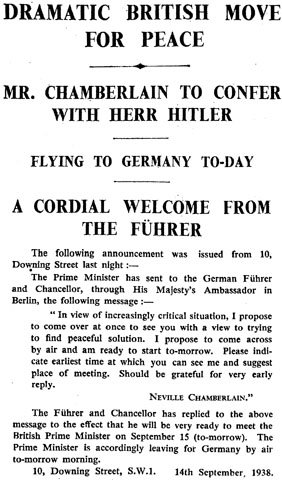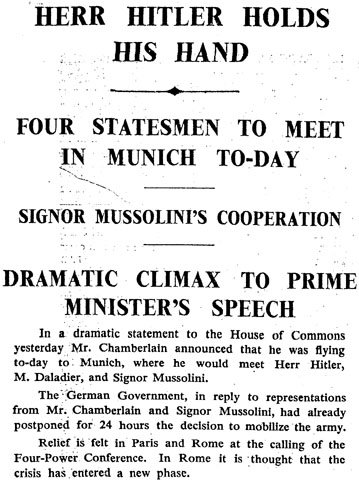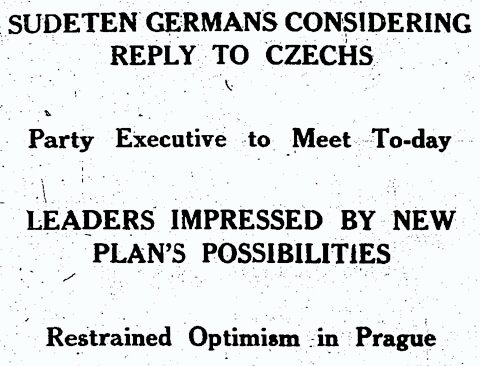
Now events are moving with a startling rapidity: all the more startling because it is Britain’s sober, solid, unexciting prime minister, the 69-year old Neville Chamberlain, who is pushing them along. He has stunned the press by announcing, as can be seen in today’s headlines from The Times above (p. 10), that he will fly to Germany to meet with Hitler in person, to see if they can’t sort out the Sudeten crisis together, face to face. This is a very novel method of conducting diplomacy — though not quite as novel, perhaps, as is often made out: the victorious Allied leaders had become used to summit meetings after the war, beginning with the Paris Peace Conference itself. But there’s no doubt that, coming at such a critical juncture, it is seen as a bold and highly imaginative attempt to cut through the darkening atmospheres of racial incidents and veiled threats, to prevent war by rational, and personal, discussion.
Today’s leader in The Times is devoted to Chamberlain’s flight (p. 11). It says that the news ‘will bring a sense of relief and profound satisfaction to all but the very few to whom any sort of discourse with a dictator is anathema’, and proof of Chamberlain’s ‘courage and common sense’.
Behind all the intricacies and discussions and multitudinous conjectures that have been whirling round the central problem of the Czech-German dispute has stood, dimly limned but unmistakably recognizable, the spectra of Armageddon — a large-scale, perhaps world-wide, war springing from a local racial difference in Central Europe. And the conviction is everywhere felt that war on this issue would be a folly and a crime, and that humanity would be heading for the madhouse if the nations of the most densely populated Continent of the world were really going to bomb one another to pieces on account of the troubles of some three and a half million folk in the pleasant land of Bohemia.
The Manchester Guardian is a bit less enthusiastic (p. 8), calling the flight a ‘bold move’, but otherwise seems unsure that it can do any good:
He [Chamberlain] will be able, perhaps, to find out precisely some of the things in Hitler’s mind about which we are uncertain and to represent to him faithfully this country’s intense desire to preserve the peace, indeed, but also to do what we believe to be right in Czecho-Slovakia. He will be aware that there are those in Germany who may regard his visit as a sign of weakness, but he will have it in his own hands to show that it is not so, that this country remains firm in its intentions, and that his motive is simply a supreme effort to find a way to peace that can honourably accept.
And with that, it moves to the Sudetenland and the idea of a plebiscite to determine which country the inhabitants want to be a part of. (I’m not sure where this idea came from: the German press attributes it to the British and French press, but that was only speculation. See Manchester Guardian, p. 12.) The leader writer is worried about the defensibility of the Czech state, as well as for the safety of Jews and anti-Nazis, if the Sudetenland were to pass to Germany. The Guardian does not like the way other countries are apparently rushing to seal Czechoslovakia’s fate:
A man may always offer his own throat to be cut, but it would be indelicate of friends to make the offer for him.
Which would seem to be a warning to Chamberlain, who, even as millions learn of his flight, is already winging his way to Munich to meet with Hitler at Berchtesgaden. By the way, Chamberlain will be flying from Heston Aerodrome (not Hendon, as is sometimes said) at 8.30am, in a British Airways Lockheed Electra, one of its latest types. According to The Times (p. 10), he’s due to land at Munich at about 1pm, and may then be flown in Hitler’s own aeroplane to Obersalzburg, and then to Berchtesgaden.
Reaction around the world seems positive. Some of the headlines from The Times (p. 10) include:
RELIEF IN BERLIN
VISIT WELCOMED
“A WEIGHT OFF THE HEART”
And:
ASTONISHMENT IN PRAGUE
TENSION RELIEVED
FIGHT AT FRONTIER VILLAGE
And:
“THE RIGHT STEP”
MESSAGE FROM CANADIAN PRIME MINISTER
And (p. 9):
MR. CHAMBERLAIN’S MISSION
FRENCH GRATITUDE
But the intense hope, of course, goes hand in hand with intense fear. The Manchester Guardian has an article on the Czech military (p. 13):
THE CZECH ARMY
Well-Trained, Well-Armed Force Behind Mountain Wall
2,000 FIGHTING AIRCRAFT
The Times reports (p. 10) that Westminster Abbey will be open from 8am today to 8am on Sunday ‘for a period of unbroken intercession in connexion with the present international crisis’:
The west portion of the nave round the Unknown Warrior’s Grave is being reserved for this purpose.
It seems safe to assume that the nation is collectively holding its breath for news from the historic meeting of Chamberlain and Hitler.
![]() This work is licensed under a Creative Commons Attribution-NonCommercial-NoDerivatives 4.0 International License.
Permissions beyond the scope of this license may be available at http://airminded.org/copyright/.
This work is licensed under a Creative Commons Attribution-NonCommercial-NoDerivatives 4.0 International License.
Permissions beyond the scope of this license may be available at http://airminded.org/copyright/.




Pingback: Airminded · Friday, 16 September 1938
Pingback: Airminded · Post-blogging the Sudeten crisis: thoughts and conclusions